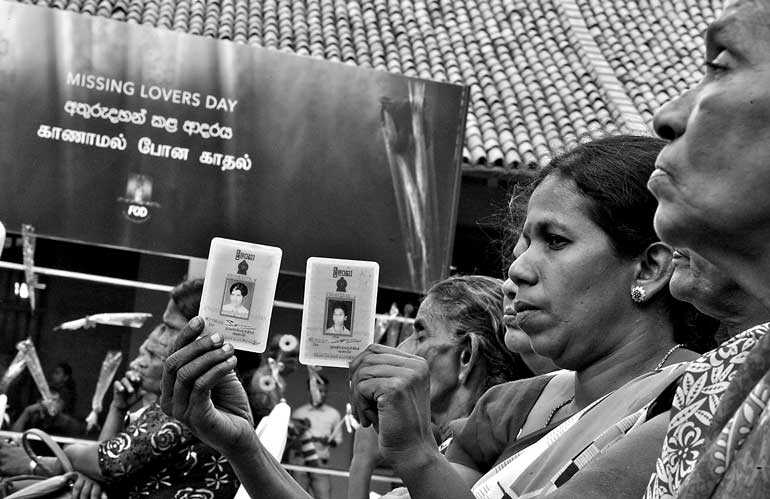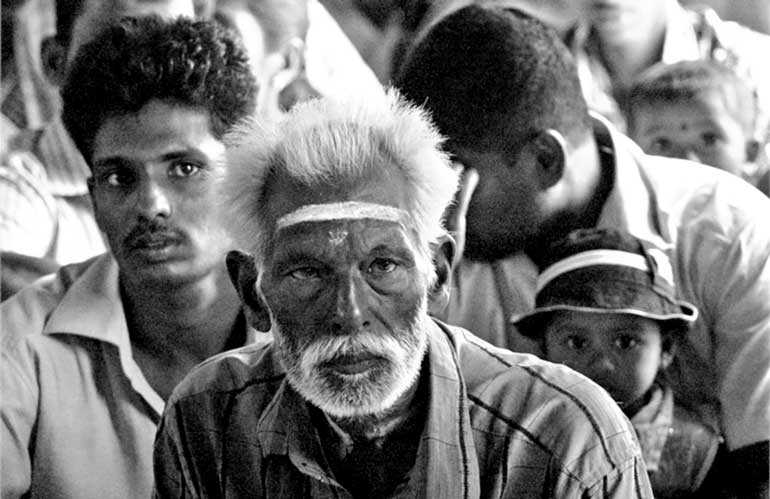Saturday Feb 21, 2026
Saturday Feb 21, 2026
Saturday, 16 March 2019 00:00 - - {{hitsCtrl.values.hits}}

Following is the written
statement submitted by
International Commission of Jurists, a non-governmental organisation in special consultative status, to the UNHRC ahead of the
interactive dialogue on Sri Lanka that is to take place on 20 March. The ICJ has been actively engaged in the UNHRC process regarding human rights and rule of law issues in Sri Lanka.
Almost 10 years after Sri Lanka emerged from a period of conflict and massive human rights violations, the Government of Sri Lanka still has largely failed to implement its human rights obligations and commitments as reflected in Resolution 30/1.
This failure particularly impacts women who were directly victimised by the war. Despite 80% of the displaced population being female and more than 23% of households now being led by women,1 issues of specific importance to women seldom get highlighted or addressed.
Furthermore, although women were in the forefront in pursuing peace and demanding truth and accountability, they now appear to have been largely excluded from meaningfully participating in transitional justice processes.
In this submission, the International Commission of Jurists (ICJ) will focus on two of four transitional justice mechanisms which the Government committed to establish under the Resolution: (a) the judicial mechanism with special counsel to investigate violations of human rights and international humanitarian law; and (b) the office of missing persons.

The judicial mechanism to investigate violations of human rights and international humanitarian law
The judicial mechanism to investigate violations of human rights and international humanitarian law has not been established. The President has publicly rejected the idea of foreign involvement in such a judicial mechanism,2 despite Sri Lanka having committed to such involvement in resolution 30/1. Although authorities have suggested the possibility of establishing a purely domestic judicial mechanism that will investigate allegations of violations of human rights,3 the Government has not even taken any steps towards this wholly inadequate measure.
In the context of adoption of Resolution 30/1, the ICJ highlighted why international participation (e.g. foreign judges, prosecutors, and investigators) in the judicial mechanism is necessary.4 First, the Sri Lankan justice system has for decades systematically failed to respond independently, impartially and effectively to violations of international human rights and humanitarian law perpetrated by security forces.5 Second there is a profound lack of trust in the domestic system from the Tamil community, arising from a perception that domestic courts have an ‘ethnic bias’. The outcome of the murder trial of Tamil parliamentarian Nadarajah Raviraj, where an all-Sinhalese jury acquitted five men including three Navy intelligence officers, seems to have further reinforced this perception.6
Women are grossly under-represented in the justice sector in Sri Lanka. Only 23% of the judges in Sri Lanka are women.7 The principle of gender equality should guide all judicial appointments,8 and will be particularly important in any judicial mechanism implementing resolution 30/1. The leadership and genuine participation of women in the judicial mechanism would contribute not only towards integrating gender into the work, but it should also build confidence of women in civil society and female victims, resulting in their fuller engagement with and participation in this and other transitional processes.
Establishment of an international judicial mechanism is particularly urgent for women in conflict-affected areas, especially those in the Northern Province who still live in a highly militarised environment and are compelled to live among their perpetrators – members of the military who have been accused of war crimes including rape and other forms of sexual violence. There have been reports of sexual harassment and demands for sexual bribery by military personnel, even after the war. This vulnerability to violence, coercion and harassment impacts other aspects of their lives including their freedom of movement and to pursue a means of living. These circumstances hold back women from pursuing prosecution against perpetrators of sexual and gender based violence for fear of reprisal and stigma.9
Furthermore, perceptions that the military continues to hold influence over the Government and that the Government generally ensures impunity of the military, are reinforced by the rewarding of high-ranking officers with promotions and diplomatic postings, instead of being brought to justice for crimes they are accused of having perpetrated during the conflict. Major General Shavendra Silva, for instance, was recently appointed Chief of Staff of the Sri Lankan Army,10 despite a lawsuit in the United States of America accusing him of war crimes.11
The Office of Missing Persons
The Government adopted the Office of Missing Persons Act in August 2016, but only established the Office of Missing Persons (OMP) in February 2018, more than a year later. The fact that the establishment of the OMP was delayed until a month before the Resolution was to be re-examined at the UNHRC has led to the perception that its creation was primarily an attempt by the Government to avoid criticism for failing to meet its commitments under the Resolution.
The establishment of this institution is especially important for women because those who escaped the war with their lives are predominantly female. These women are now heads of their households and must navigate the complicated processes of seeking the fate and whereabouts of their family members while dealing with a myriad of other socioeconomic issues.
A core function of the OMP is to facilitate the provision of certificates of absence to family members of a missing person. A certificate of absence legally recognises that a person is disappeared and allows the family to conduct transactions as though the person is dead. The family may then be able to access bank accounts of the disappeared person and receive social welfare benefits they are entitled to as next of kin.
These certificates of absence are most especially important for women in the Northern Province whose husbands are missing. Under the Jaffna Matrimonial Rights and Inheritance Ordinance, married Tamil women cannot conduct transactions involving immovable property (e.g. land) they own without the written consent of their husbands.12 This expressly discriminatory legal provision compounded with the disappearance of their husbands prevents women from using their properties to resume their livelihoods and restore normality to their lives.
The ICJ has already received reports that many women are hesitant to apply for certificates of absence, fearing that once issued, the State may cease any effort to find the disappeared person on the basis that they have been deemed to have died. There is therefore a need for the OMP to spread awareness about the use and importance of these certificates, especially among women.
Recommendations
The ICJ considers that the gravity and character of the crimes under international law committed in Sri Lanka, and the failure of the Government of Sri Lanka to meet its obligations and commitments to ensure justice for such crimes including as provided for in resolution 30/1, means that referral to the International Criminal Court or the creation of another international mechanism to facilitate criminal accountability would be fully warranted. If however the Council does not choose to pursue these options at this stage, the ICJ urges the Council at minimum to:
nContinue the monitoring of Sri Lanka through the adoption of a new resolution to ensure that the Government complies with all its obligations and commitments as reflected in resolution 30/1.
The ICJ urges the Government of Sri Lanka to:
Footnotes:
1Satkunanathan Ambika, (2017). “Sri Lanka: The impact of militarization on women”, Oxford Handbook of Gender and Conflict (Fionnuala Ní Aoláin & others, eds).
2President rejects foreign judges, Daily Mirror, 2017.01.07 [http://www.dailymirror.lk/article/President-rejects-foreign-judges-121833.html].
3Sri Lanka President wants ‘internal ‘ war crimes court, BBC, 3 October 2015 [https://www.bbc.com/news/world-asia-35376719].
4E.g. Sri Lanka: ICJ Statement on UN accountability report, 30 September 2015, [https://www.icj.org/sri-lanka-icj-statement-on-un-accountability-report/].
5 See e.g. ICJ’s 150-page report, Authority without Accountability: The Crisis of Impunity in Sri Lanka (2012), [https://www.icj.org/sri-lanka-new-icj-report-documents-crisis-of-impunity/].
6 Raviraj murder: Acquittals raise credibility concerns, 26 December 2016 [https://www.thehindu.com/news/international/Raviraj-murder-Acquittal-raises-credibility-concerns/article16943223.ece].
7 Cho, Yonjoo & Ghosh, Rajashi & Y. Sun, Judy & Mclean, Gary. (2017). Current Perspectives on Asian Women in Leadership: A Cross-Cultural Analysis. 10.1007/978-3-319-54996-5.
8 Bangkok General Guidance on Applying a Gender Perspective, paragraph 18. Available at https://www.icj.org/wp-content/uploads/2018/06/Southest-Asia-Bangkok-Guidance-Advocacy-2016-ENG.pdf.
9 International Crisis Group, Sri Lanka’s Conflicted-Affected Women: Dealing with the Legacy of War (28 July 2017), page. 11, available at https://reliefweb.int/sites/reliefweb.int/files/resources/289-sri-lankas-conflict-affected-women-dealing-with-the-legacy-of-war.pdf
10 See Sri Lanka: Allegations against new army chief of staff highlight the urgent need to address impunity https://www.amnesty.org/en/documents/asa37/9665/2019/en/
11 Lawsuit filed against Sri Lankan Army General Responsible for execution, torture and attacking civilians, Human Rights Brief, 23 September 2011,[ http://hrbrief.org/2011/09/lawsuit-filed-against-sri-lankan-army-general-responsible-for-executions-torture-and-attacking-civilians/?utm_source=feedburner&utm_medium=email&utm_campaign=Feed%3A+hrbrief+%28The+Huma].
12 Section 6 of the Jaffna Matrimonial Rights and Inheritance Ordinance.